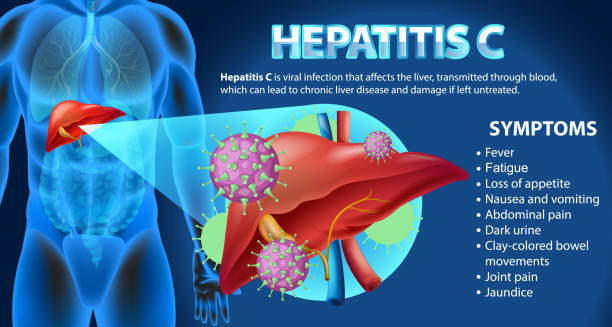The symptoms of hepatitis C vary dramatically depending on whether the infection is acute or chronic.
Many people feel fine at first or for many years. Some notice mild, flu-like symptoms in the early stage. However, most people don’t show any signs. The virus quietly harms the liver over time. That’s why hepatitis C is often called a “silent epidemic.” In many cases, people only learn they have it during a routine check-up or after they develop serious problems like cirrhosis or liver cancer.
Early Phase: Acute Hepatitis C Symptoms
Acute hepatitis C happens in the first six months after infection. Around 70–80% of people do not feel any symptoms during this time. So, the infection often goes unnoticed.
For the few who do get symptoms, these usually start 2 to 12 weeks after exposure. Common signs include:
- Feeling very tired
- Fever or chills
- Loss of appetite
- Nausea or vomiting
- Pain in the upper right belly
- Body aches or joint pain
- Dark-colored urine
- Pale, clay-colored stools
- Yellow skin or eyes (jaundice)
These symptoms may seem like a cold or stomach bug. Often, they go away on their own. In about 15–25% of people, the body fights off the virus without treatment.
Still, during this time, the person can pass the virus to others—especially through blood contact.
Long-Term Phase: Chronic Hepatitis C Symptoms
If the virus stays in the body for more than six months, it becomes chronic hepatitis C. This stage is more dangerous because it lasts for years.
The immune system may slow down the virus, but it doesn’t stop it. Over time, the liver becomes inflamed and scarred. This happens slowly and often without symptoms.
Most people still feel fine. But as the liver becomes weaker, clearer symptoms may appear.
Common General Symptoms
- Constant tiredness: This is one of the most common and draining issues.
- Brain fog: People may find it hard to focus or remember things.
- Mood changes: Anxiety, sadness, or irritability can occur.
- Poor sleep: Many have trouble sleeping or feel tired even after rest.
Digestive and Stomach Symptoms
- Loss of hunger
- Losing weight
- Bloated belly
- Mild pain in the upper right side
- Feeling sick after eating
These signs may seem minor at first. Often, people don’t realize they are liver-related until a blood test shows problems.
Signs of Serious Liver Damage from Hepatitis C
As liver disease worsens, more noticeable symptoms appear. These signs often show up in people with cirrhosis or liver failure.
Jaundice
The skin and eyes turn yellow when the liver can’t process waste well. This shows the liver is failing.
Swollen Belly (Ascites)
Fluid builds up in the belly, causing swelling and pain. This means the liver is under serious stress. Doctors may drain the fluid or give medicine to help.
Bleeding from the Stomach or Throat
As cirrhosis worsens, pressure in the liver veins rises. This causes veins in the throat or stomach to swell and bleed. This can be life-threatening.
Hepatic Encephalopathy
The liver can no longer remove toxins from the blood. This causes brain problems such as:
- Confusion or forgetfulness
- Trouble moving or staying balanced
- Mood or behavior changes
- Sleepiness or, in rare cases, coma
Muscle Loss and Weight Drop
The body burns muscle when the liver stops working well. Chronic inflammation also leads to weight loss.
When Hepatitis C Affects the Skin and Body
Hepatitis C sometimes causes problems outside the liver. These are called extrahepatic symptoms, and they can be the first signs of infection.
Common issues include:
- Itchy skin
- Skin rashes or blood vessel swelling (vasculitis)
- Joint pain
- Cryoglobulinaemia: A condition that causes skin sores, nerve pain, and kidney issues
- Lichen planus: An itchy skin condition linked to the virus
- Porphyria cutanea tarda: A rare disorder that causes skin to blister in sunlight
These issues can happen even if the liver is not badly damaged. Doctors may test for hepatitis C if these signs appear, especially in high-risk groups or people with a history of Hepatitis A.
Hepatitis A and Liver Cancer Risk in Hepatitis C
Chronic hepatitis C can raise the risk of liver cancer, called hepatocellular carcinoma (HCC). These symptoms usually don’t appear until the cancer is advanced.
Warning signs may include:
- Losing weight without trying
- Pain or a feeling of fullness in the belly
- Ongoing fatigue
- Yellowing of skin or eyes
- A lump or swelling in the liver area
People with cirrhosis need regular check-ups every six months. Ultrasound is often used to catch liver cancer early, when it is still treatable.
Hepatitis A and Mental Health in Hepatitis C
Hepatitis C doesn’t just affect the body—it affects how people feel emotionally, too. Even without strong physical symptoms, mental and social stress is common.
Many people face:
- Shame or fear of telling others
- Worry about getting sicker
- Trouble getting or keeping a job or insurance
- Feeling hopeless or depressed
These struggles can grow worse with tiredness, money issues, or poor access to care. In some cases, having other infections like Hepatitis A adds to the stress.
Support from doctors, mental health workers, and community groups can make a big difference.
In Summary
The symptoms of hepatitis C range from silent to severe. Most people do not feel sick during the early or even middle stages. But the liver may still be getting damaged the whole time. By the time symptoms do appear, the damage can be serious.
That’s why it’s so important to screen people at risk—especially if they’ve had other infections like Hepatitis A. Early diagnosis leads to quick treatment, and modern medicine can now cure the virus in most people before long-term damage sets in.


